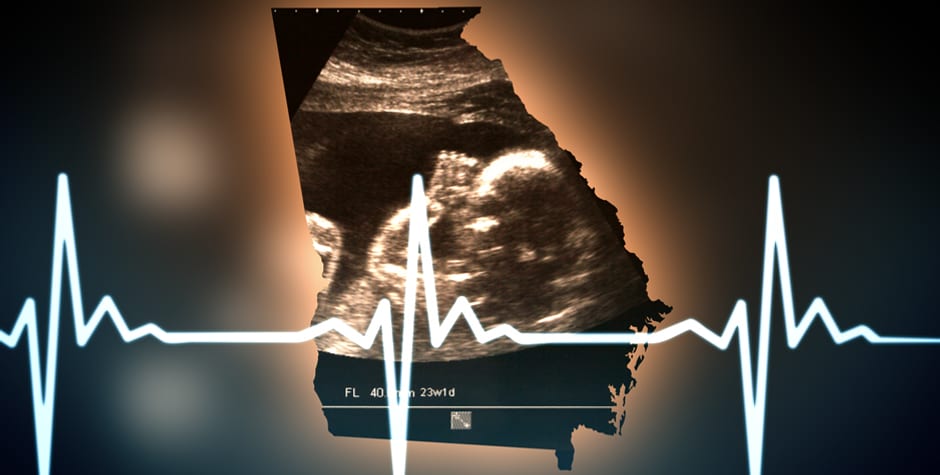Georgia State Judge Blocks Heartbeat Bill, Claiming It Was “Unconstitutional When Drafted, Voted Upon, and Enacted,” Completely Ignoring the Supreme Court’s Clear Ruling in Dobbs
Recently, Judge Robert McBurney of the Fulton County Superior Court in Georgia ruled that certain portions of a Georgia law passed in 2019—which bans abortions after the detection of a fetal heartbeat—“were plainly unconstitutional when drafted, voted upon, and enacted,” and barred them from being enforced. In a brazen ruling of legal contortionism, the judge completely ignored the fact the Dobbs ruling made crystal clear that the Constitution itself has NEVER prohibited abortion restrictions, and that it was Roe that was wrongly decided from the start.
As background, in 2019, the Georgia legislature passed a bill entitled the “Living Infants Fairness and Equality (LIFE) Act.” Governor Kemp signed the bill into law, and it took effect, in part, on January 1, 2020. The purpose of the bill was to make it the policy of the state of Georgia to recognize unborn children as natural persons. That recognition affords unborn children protections under the Federal Constitution, which declares under the 14th Amendment “nor shall any State deprive any person of life, liberty, or property, without due process of law, nor deny any person within its jurisdiction the equal protection of the laws,” and the Georgia Constitution which affirms that “[n]o person shall be deprived of life . . . except by due process of law,” and that “[p]rotection to person and property is the paramount duty of the government and shall be impartial and complete.” The law also has a provision stating that the term “natural person” includes unborn children with a detectable heartbeat. The law further barred any abortions from occurring after a heartbeat was detectable.
The current legal challenge against the law attacks three specific sections: Sections 4, 10, and 11. Section 4 makes it a crime to commit an abortion once a fetal heartbeat is detected, with certain exceptions. Section 10 requires a doctor to determine if a heartbeat is present before performing an abortion, and Section 11 requires a doctor who performs an abortion to submit certain reports to the Department of Public Health.
In considering the case, Judge McBurney found that “Sections 4 and 11 of the LIFE Act were plainly unconstitutional when drafted, voted upon, and enacted,” and stated that “[t]hey are therefore void ab initio and of no effect.” According to his reasoning, this is because, under Georgia law, “[l]egislative acts in violation of this Constitution or the Constitution of the United States are void, and the judiciary shall so declare them.” As a side note, the language Judge McBurney cites here says “void,” not “void ab initio” (i.e., void from the beginning), which is of vast importance in the legal world. Judge McBurney further notes:
In other words, per controlling Georgia precedent, the proper legal milieu in which to assess the LIFE Act’s constitutionality is not our current post-Roe Dobbsian era but rather the legal environment that existed when H.B. 481 was enacted. At that time -- the spring of 2019 -- everywhere in America, including Georgia, it was unequivocally unconstitutional for governments -- federal, state, or local -- to ban abortions before viability.
But Judge McBurney undermines this very reasoning in several footnotes throughout his decision. For example, in footnote 7 of his decision the judge writes:
Put differently: “An unconstitutional act is not a law; it confers no rights; it imposes no duties; it affords no protection; it creates no office; it is, in legal contemplation, as inoperative as though it had never been passed.” Herrington v. State, 103 Ga. 318, 320 (1898), quoting Norton v. Shelby County, 118 U.S. 425, 442 (1886).
This example provided by Judge McBurney is exactly what occurred when the Supreme Court in Roe v. Wade fabricated a “constitutional” right to abortion. Yet, in a separate footnote, Judge McBurney argues that there was a federal constitutional right to abortion that existed for 50 years
because the very same Supreme Court told us so. Repeatedly. Those prior pronouncements carried no lesser effect and were entitled to no less deference in Georgia or anywhere else in the Republic than that which we all must afford the Dobbs decision. Dobbs is now the law of the land; this Court and every other court in America are bound to apply it faithfully and completely.
But the very heart of the Dobbs decision is ignored by Judge McBurney, not followed. As Justice Alito points out in Dobbs, Roe was an “abuse of judicial authority,” “was egregiously wrong from the start,” “and the decision has had damaging consequences.” One of those damaging consequences can be seen in Judge McBurney’s decision—the wrongful conclusion that a law passed to follow the letter of both the federal and state Constitutions has been declared void ab initio because of an unconstitutional judicial opinion. According to Judge McBurney’s own reasoning in footnote 7, Roe itself was an unconstitutional act that conferred no right and should be viewed as “inoperative as though it had never been passed.” Being unconstitutional from the time that it was wrongly decided in 1973 forward, Roe cannot have rendered the LIFE Act unconstitutional at the time of its passage in 2019.
Thus, a true adherence to Dobbs requires a finding that it was Roe and Casey that were unconstitutional, not the LIFE Act. We are already in contact with Georgia officials, and are looking to take legal action in support of overturning this horrible decision.
